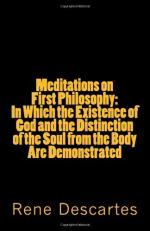Sect. LXXIII. Comparison of the World with a Regular House. A Continuation of the Answer to the Objection of the Epicureans.
But why should it appear less ridiculous to hear one say that the world made itself, as well as that fabulous house? The question is not to compare the world with a cave without form, which is supposed to be made by chance: but to compare it with a house in which the most perfect architecture should be conspicuous. For the structure and frame of the least living creature is infinitely more artful and admirable than the finest house that ever was built.
Suppose a traveller entering Saida, the country where the ancient Thebes, with a hundred gates, stood formerly, and which is now a desert, should find there columns, pyramids, obelisks, and inscriptions in unknown characters. Would he presently say: men never inhabited this place; no human hand had anything to do here; it is chance that formed these columns, that placed them on their pedestals, and crowned them with their capitals, with such just proportions; it is chance that so firmly jointed the pieces that make up these pyramids; it is chance that cut the obelisks in one single stone, and engraved in them these characters? Would he not, on the contrary, say, with all the certainty the mind of man is capable of: these magnificent ruins are the remains of a noble and majestical architecture that flourished in ancient Egypt? This is what plain reason suggests, at the first cast of the eye, or first sight, and without reasoning. It is the same with the bare prospect of the universe. A man may by vain, long-winded, preposterous reasonings confound his own reason and obscure the clearest notions: but the single cast of the eye is decisive. Such a work as the world is never makes itself of its own accord. There is more art and proportion in the bones, tendons, veins, arteries, nerves, and muscles, that compose man’s body, than in all the architecture of the ancient Greeks and Egyptians. The single eye of the least of living creatures surpasses the mechanics of all the most skilful artificers. If a man should find a watch in the sands of Africa, he would never have the assurance seriously to affirm, that chance formed it in that wild place; and yet some men do not blush to say that the bodies of animals, to the artful framing of which no watch can ever be compared, are the effects of the caprices of chance.




